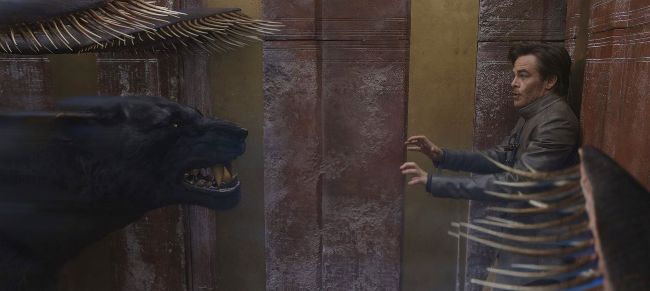THE Rolling Dice
SINCE THE GAME WAS CREATED FIVE DECADES AGO, FANS HAVE BEEN CRYING OUT FOR A WORTHY MOVIE. CAN DUNGEONS & DRAGONS: HONOUR AMONG THIEVES FINALLY GET THAT RIGHT? BRING ON THE GELATINOUS CUBES…
WORDS DAN JOLIN

Cornered: Chris Pine’s Edgin.
THE QUEST BEGAN 40 YEARS AGO
In March 1983, Gary Gygax, co-creator of fantasy role-playing game Dungeons & Dragons (D&D) and president of its then-publishing company TSR, moved from his hometown of Lake Geneva, Wisconsin, to Hollywood. His holy grail? To turn his ground-breaking tabletop game of monster-bashing, treasure-grabbing, dungeon-mastering and funny-shaped-dice-throwing into a big-screen blockbuster.
It wasn’t such a crazy idea. D&D was so popular by then that TSR was turning over $30 million per year. The game had even recently made a high-profile cameo in E.T.. Gygax, a former insurance underwriter who’d invented D&D in his basement a decade earlier (in collaboration with David Arneson), believed his Tolkien-riffing creation, in which players embarked on imaginary adventures as elves, dwarves, fighters and magic-users, was ideal material for cinema. He’d already commissioned a script, by James Goldman (The Lion In Winter, Robin And Marian), and promised readers of the TSR-published Dragon magazine that the eventual film would match Star Wars and Raiders Of The Lost Ark. “Give us a chance to prove that the [fantasy] genre can be good!” he wrote.
From his opulent Beverly Hills estate formerly owned by Golden Age director King Vidor, where Gygax threw cocaine-fuelled parties, he pitched studio executives including Universal’s Sid Sheinberg, and met with filmmakers like Excalibur director John Boorman and Orson Welles (who Gygax wanted for the role of “a villainous mage”).
His adventure started promisingly, with CBS greenlighting a kitsch Saturday-morning cartoon series about a gang of kids thrown into a D&D world via a magical fairground ride. But, despite a few encouraging initial responses, he was unable to seal a movie deal. Beset by a corporate struggle that eventually exiled him from his own company, and a ‘Satanic Panic’ in the States that saw religious leaders and concerned parents absurdly attacking the game as promoting devil-worship and teenage suicide, Gygax (who died in 2008) had to abandon his mission.